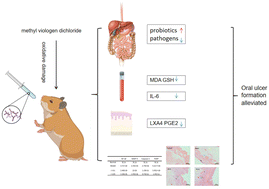Both live and heat-killed Bifidobacterium animalis J-12 alleviated oral ulcers in LVG golden Syrian hamsters by gavage by directly intervening in the intestinal flora structure
Abstract
Live and heat-killed Bifidobacterium has been proven to have anti-inflammatory and antioxidant effects. In this study, we evaluated the effects of live and heat-killed Bifidobacterium animalis J-12 (J-12) on the oral ulceration of LVG golden Syrian hamsters after buccal membrane injection with methyl viologen dichloride. Results showed that interleukin-1β, glutathione, and malondialdehyde in serum were downregulated by the gavage of live and heat-killed J-12 bacteria. The J-12 live and heat-killed bacteria can reduce the expression of matrix metalloproteinase-9 by reducing the expression of nuclear factor kappa-B, thus reducing the expression of anti-inflammatory factors lipoxin A4 and prostaglandin E2. Reducing the expression of caspase-3 and adenosine diphosphate ribose polymerase resulted in a reduction of ulcer tissue DNA damage. In addition, regulating the structure of the intestinal flora prevented the process of oral ulcer formation. This study shows that J-12 can reduce the risk of oral ulcer formation while also having a positive effect on inhibiting existing oral ulcer growth.



 Please wait while we load your content...
Please wait while we load your content...